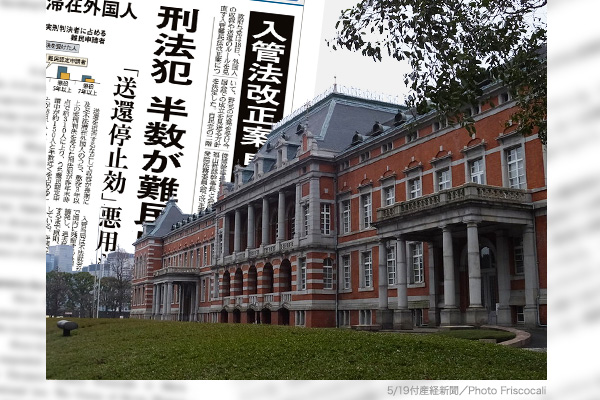In the previous “Speaking Out” column dated May 17, I pointed out that discussions on a revision to Japan’s Immigration Control Act over the treatment of those avoiding deportation (foreigners who have received deportation orders but evaded deportation). On May 18, however, the government and the ruling parties gave up on enacting the revision during the current Diet session ending in mid-June, leaving problems unresolved regarding the prolonged detention of deportees, deportee fugitives and the protection of detainees’ human rights amid an increase in the number of deportation evaders.
I wish that the revision would be enacted during the next Diet session. To this end, bias in discussions on foreign resident policy should be corrected. First, the public should be informed that the revision is designed to address the problem of those avoiding deportation.
Increasing foreigners avoiding deportation
The Justice Ministry uses the word “those avoiding deportation,” but the Yomiuri Shimbun newspaper is the only nationwide paper to use the word in Japan. This might have left people failing to understand the objective of the revision as described by Justice Minister Yoko Kamikawa. “Problems such as the avoidance of deportation and the prolonged detention of those avoiding deportation have arisen,” the minister said. “Various measures would be combined to resolve these problems en masse. The revision would further clarify that Japan would accept foreigners who should be allowed to stay and deport those who break rules.”
The Immigration Service Agency puts a document titled “Tell Me More! Proposed Revisions to the Immigration Control Act” (in Japanese) on its website. Among politicians from the ruling parties, House of Councilors lawmaker Masaaki Akaike from the Liberal Democratic Party in his blog explains that various problems have arisen because of as many as 3,000 foreigners avoiding deportation and that the revision is designed to protect human rights of foreigners.
Nevertheless, mass media reports focus on arguments against the revision from deportee supporters and lawyers, who have called for giving residency status to all illegal residents through amnesty. The message of those who proposed the revision have failed to spread among the people. This bias should be corrected first.
Change of mind after meeting with supporters
As for the controversial death of a Sri Lankan woman during detention, facts must be verified and fact-based measures to prevent such incident should be discussed. In my previous “Speaking Out” column, I wrote that the Sri Lankan woman “entered Japan with a student visa and lost visa status by failing to pay tuition, becoming an illegal resident.” She had filed for refugee status just after losing visa status and the filing was rejected. After the rejection, she ran away, becoming an illegal resident. In 20 months, she turned herself in to police. Hoping to return home, she was standing by under the novel coronavirus pandemic. After meeting with her supporters, however, she became a foreigner avoiding deportation. Details are as follows:
The Sri Lankan woman entered Japan with a student visa in June 2017. When the student visa term of one year and three months was to expire in September 2018, she filed for refugee status for the reason that she would be killed by an underground organization if she returns home. As the filing was rejected in January 2019, she ran away, becoming an illegal resident. On August 19, 2020, she turned herself in to police to escape from violence by a Sri Lankan man who was living together with her. She was transferred to the Immigration Office. On August 20, she was accommodated into an Immigration Office facility, expressing will to return home. Under the impact of the novel coronavirus pandemic, however, her repatriation became impossible. After she met with her supporters in December, she came to avoid deportation. She complained of feeling ill in January 2021 and died on March 6.
Tsutomu Nishioka is a senior fellow and a Planning Committee member at the Japan Institute for National Fundamentals and a visiting professor at Reitaku University.


